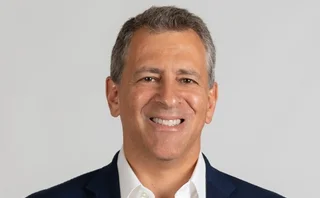
Innovation of the year: enmacc
Energy Risk Awards 2019: Digital trading platform is revolutionising OTC energy trading in Germany and beyond

The innovation behind the enmacc platform is a simple one: to digitalise over-the-counter energy trading, making energy procurement and trading a seamless process without the need for time-consuming phone calls, multiple communication streams and the Excel spreadsheets that accompany it.
But what sets the Munich-based trading platform apart is the quality of its execution and the success it has had in its short life in attracting users and liquidity in standard and non-standard gas and power products in Germany, Austria and the Netherlands.
“We take a different approach,” says Jens Hartmann, enmacc’s chief executive. “We have more of a start-up approach. We’re building a platform rather than a traditional trading venue.”
The company was set up in 2016 by Volker Puck, who had spent the previous 15 years trading foreign exchange at UniCredit and energy at Syneco Trading. “He was annoyed by all the manual steps that were still involved; most of the trades in less liquid standard products and basically all non-standard products were still happening on the phone, using email and Excel, all these outdated tools,” says co-founder Hartmann, who brings a background in telecoms and consulting at McKinsey.
The initial idea was “to introduce modern communications to energy trading”, he says, but the company soon evolved into a trading platform. “Within a few months, we had 50 companies using the tools we provided to easily and quickly send out RFQs [requests for quotation].” This evolved into the enmacc platform, launched at the end of 2016.
Since then, some 200 companies have signed up to the platform, which offers two products: enmarket, an OTC price screen and open marketplace for one-click trading of standard energy products; and its core product, entender, an RFQ platform for standard and non-standard energy products.
We take a different approach. We have more of a start-up approach. We’re building a platform rather than a traditional trading venue
Jens Hartmann, enmacc
Enmarket offers continuous bids and offers provided by market makers including Engie, OMV, Statkraft, Vattenfall and Wingas. It is aimed at medium-sized players, providing access to more liquid products, such as prompt calendar years and quarters.
Hartmann describes entender as a “super-fast RFQ marketplace”, allowing users to, within a few seconds, seek quotes on either standard or bespoke contracts, and then efficiently negotiate and refine the trade. This provides a clear differentiation from conventional energy exchanges, he explains.
“Around half of our business is in very specific tenders, or RFQs, allowing users to specify the shapes or profiles that suit them. It’s not something you can trade on an exchange.” On the other hand, enmacc users must physically settle trades, and the platform doesn’t yet offer clearing.
Equally, Hartmann says enmacc isn’t currently attempting to cater for large speculative traders, such as hedge funds. “For downstream players, however, or those looking to trade something very specific that may not be visible on the screen to everyone, they are very happy with RFQs.”
The company took a somewhat novel approach to building the business: rather than chase the big players, it first sought to build demand from medium-sized firms. “Building a marketplace is critical – you need liquidity. We first collected downstream demand-side players and, once we had them, we could attract the interest of the large suppliers,” says Hartmann.
Now the platform is established, it provides a novel route to market for these large firms. “I think there was a need for this platform,” says Jonas Risse, energy derivatives sales trader, structured origination at Engie Global Energy Management. “It aggregates a lot of screens and methods of communication. The entender platform enables smaller Stadtwerke to collect several prices with one click, instead of having to call around all day, which takes time. That’s really shaking up the German energy market.”
The next stage for the platform is to expand into other European markets – eastern Europe, the Nordics, Switzerland and the UK – in July. “The idea is to build a pan-European marketplace where participants from all regions can interact with each other,” says Hartmann.
Unlike exchanges and most broker screens, where execution takes place without firms knowing who is on the other side of their trade, on the enmacc platforms, users can see with whom they are transacting and even communicate with potential counterparties pre-trade through an integrated chat system. “Smaller players in the downstream segment like to know with whom they are trading, pre-trade. It makes trading a personal experience, and we believe in that,” says Hartmann.
This is also appreciated by larger firms. “We like enmacc’s approach as we get matched with clients, but we know who we are trading with and, importantly, we can communicate directly with them,” says Risse at Engie. “In this way we sometimes get to chat to firms who are completely new to us.”
However, enmacc is also planning this summer to introduce optional anonymous trading. “For larger players, there may well be a use case – such as a large trade, or trading a product with a huge bid-offer spread – where the users wish to request quotes anonymously. We think traders should always be in charge of their information.” Hartmann adds.
A particular appeal of the platform, says Hartmann, is the ease with which users can integrate the trading process with their own trade capture systems. “As a platform, we are completely open. We promote automated or digital processes for deal-capturing and deal-confirmation as well as for quoting or managing credit lines,” he says. “We’re committed to taking the manual steps out of OTC energy trading.”
Only users who have a paid subscription or are part of a corporate subscription are able to print or copy content.
To access these options, along with all other subscription benefits, please contact info@risk.net or view our subscription options here: http://subscriptions.risk.net/subscribe
You are currently unable to print this content. Please contact info@risk.net to find out more.
You are currently unable to copy this content. Please contact info@risk.net to find out more.
Copyright Infopro Digital Limited. All rights reserved.
As outlined in our terms and conditions, https://www.infopro-digital.com/terms-and-conditions/subscriptions/ (point 2.4), printing is limited to a single copy.
If you would like to purchase additional rights please email info@risk.net
Copyright Infopro Digital Limited. All rights reserved.
You may share this content using our article tools. As outlined in our terms and conditions, https://www.infopro-digital.com/terms-and-conditions/subscriptions/ (clause 2.4), an Authorised User may only make one copy of the materials for their own personal use. You must also comply with the restrictions in clause 2.5.
If you would like to purchase additional rights please email info@risk.net
More on Commodities
Energy Risk Asia Awards 2025: The winners
Winning firms showcase the value of prudent risk management amid challenging market conditions
Data and analytics firm of the year: LSEG Data & Analytics
Energy Risk Awards 2025: Firm’s vast datasets and unique analytics deliver actionable insights into energy transition trends
OTC trading platform of the year: AEGIS Markets
Energy Risk Awards 2025: Hedging platform enhances offering to support traders and dealers in unpredictable times
Electricity house of the year: Natixis CIB
Energy Risk Awards 2025: Bank launches raft of innovative deals across entire electricity supply chain
Voluntary carbon markets house of the year: SCB Environmental Markets
Energy Risk Awards 2025: Environmental specialist amplifies its commitment to the VCM
Sustainable fuels house of the year: Anew Climate
Energy Risk awards 2025: Environmental firm guides clients through regulatory flux
Weather house of the year: Parameter Climate
Energy Risk Awards 2025: Advisory firm takes unique approach to scale weather derivatives markets
Hedging advisory firm of the year: AEGIS Hedging
Energy Risk Awards 2025: Advisory firm’s advanced tech offers clients enhanced clarity in volatile times







